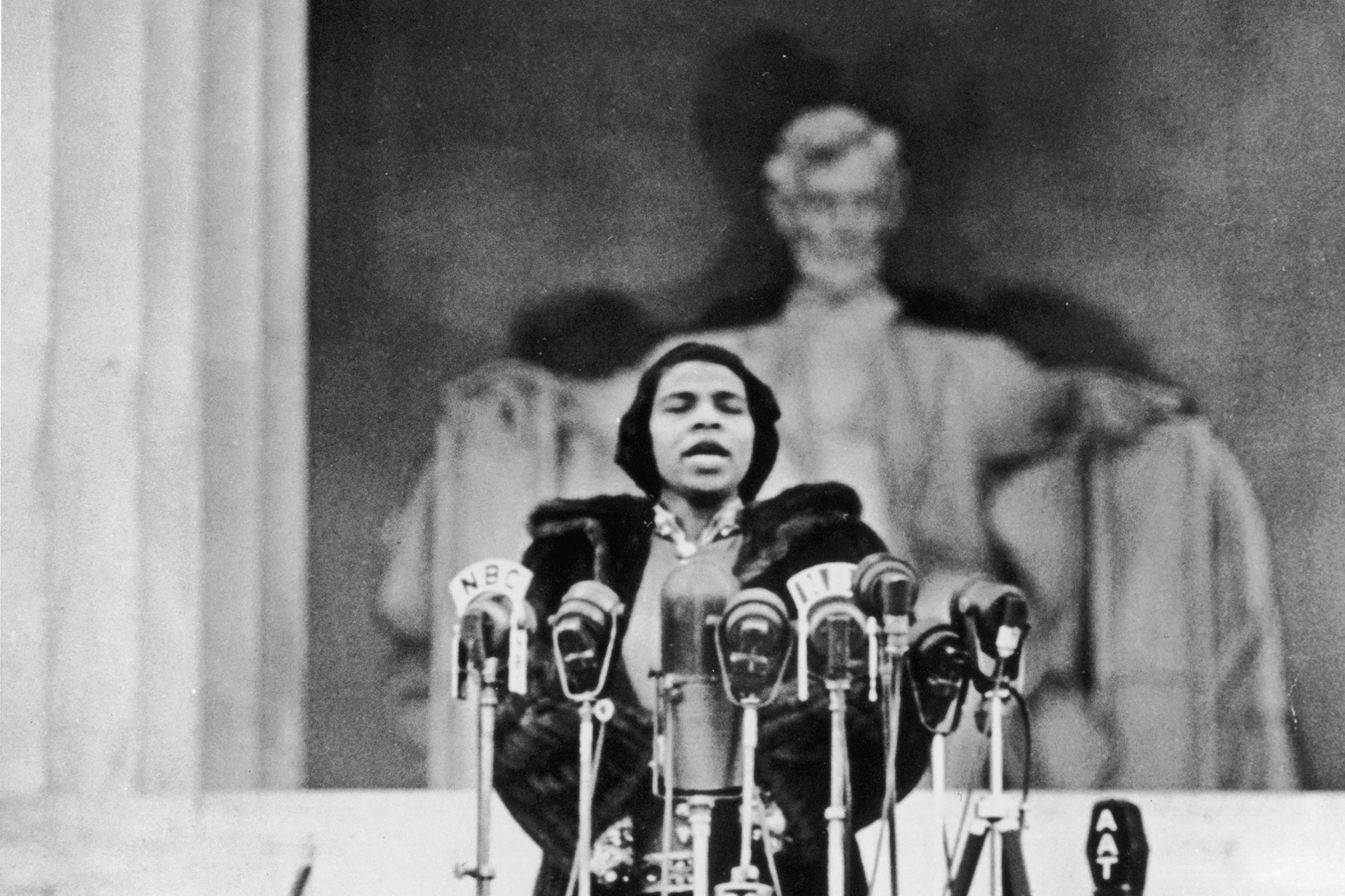
“A voice like yours is heard once in a hundred years,” Italian conductor Arturo Toscanini told Marian Anderson after he heard her sing during a European concert tour. The brilliant black singer had traveled to Europe in the 1930s to avoid the racial prejudice she faced in America. During her European concert tour, the operatic contralto became a sensation. But when she returned to the U.S., she was often not able to perform for segregated audiences. She was denied entry to many restaurants and hotels in the cities she toured. She sometimes had to iron her beautiful gowns in the alley of the hotels instead of the basement.
In 1939, her manager tried to book her a show at Constitution Hall in Washington D.C. But it turned out the venue, which was run by the Daughters of the American Revolution (DAR), only allowed white artists. First Lady Eleanor Roosevelt heard that Anderson had been turned away and withdrew her membership from the DAR. Instead, she arranged for Anderson to sing at the Lincoln Memorial.
When I need hope, I often look to history—specifically the history of black artistic excellence in America. Anderson herself was never overtly political. But there was something inherently political about a black woman singing classical music on the steps of the Lincoln Memorial to 75,000 people. Her voice—and the dignity and artistry with which she performed—was a commentary on the racial politics of the time, but was also capable of transcending those politics. She continues to inspire generations of artists like me.
I’m not the only one. Leontyne Price, who turns 92 on Feb. 10, went to hear Anderson sing at a recital in Jackson, Miss. when she was 9 years old. She said she immediately told her mother, “This is it, mama. This is what I’m going to be.” In 1955, Price became the first African-American singer to appear in televised opera in an NBC production of Tosca. That’s the same year Anderson broke the color barrier at the Metropolitan Opera, becoming the first black soloist at the famed opera house.
See the 2019 Optimists issue, guest-edited by Ava DuVernay.
Price says her groundbreaking appearance on NBC caused uproar. The South chose not to air the broadcast. Black people were rarely seen on television at the time and interracial marriage and dating was also illegal in many southern states. (Price had a white leading man.) But Price says she didn’t focus on any of that noise. She put all her energy into her voice and her performance. She was exceptional—so much so that when she made her debut at the Metropolitan Opera in 1961, she received a 42-minute standing ovation, still one of the longest ovations in the history of the opera house. In 1982, Price was invited to perform for the DAR. Aware of the history, she stood there and dedicated her performance to Anderson, who 43 years earlier had been turned away by that organization. I watch the video often. I get goosebumps every time.
Anderson and Price dared to create a space for themselves that did not exist before. They show that you can create a way where there is no way. I’ve always hoped that’s what I would do with my life, and in some ways, I’ve begun to: as the first openly transgender person to be nominated for a Prime Time acting Emmy, as the first to appear on the cover of this magazine. Hopefully, I, too, have opened some doors and many more will follow.
The tough times for black folks and trans folks in this country are not over. Doing a college tour for the last five years, I’ve gotten to meet hundreds of trans and LGBTQ+ students and have heard about their struggles. It’s rough for a lot of them. Many can’t access healthcare or are studying at a university that doesn’t even acknowledge their identity. But they’re finding ways to push back, to fight, to follow their dreams.
My ancestors went through slavery, Jim and Jane Crow, and yet managed to come out with some of the best music, art and culture that the world has ever known. So many of us have managed to excel and have love in our hearts in the face of such degradation. When I look at the history and the brilliance of African Americans, it gives me a tremendous amount of optimism with perspective. It is horrible what far too many of us have endured. But the history of black excellence in America gives us a template for how to fight—and how to not be demoralized by the fight.
See the 2019 Optimists issue, guest-edited by Ava DuVernay.
More Must-Reads from TIME
- How Donald Trump Won
- The Best Inventions of 2024
- Why Sleep Is the Key to Living Longer
- Robert Zemeckis Just Wants to Move You
- How to Break 8 Toxic Communication Habits
- Nicola Coughlan Bet on Herself—And Won
- Why Vinegar Is So Good for You
- Meet TIME's Newest Class of Next Generation Leaders
Contact us at letters@time.com